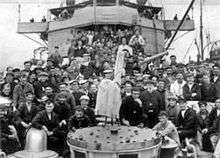HMS Scourge (1910)
HMS Scourge was a Beagle-class destroyer, launched in 1910 and served in the Royal Navy. In 1913 she was transferred to the Third Destroyer Flotilla.[2] She was used during the Gallipoli campaign to help transfer regiments to the shore at Anzac Cove and Suvla Bay. Subsequently, she assisted in the rescue of passengers from the sinking HMHS Britannic.
.jpg) HMS Scourge at sea 1914 | |
| History | |
|---|---|
| Name: | HMS Scorpion |
| Builder: | R. W. Hawthorn Leslie & Company[1] |
| Launched: | 11 February 1910[1] |
| Fate: | Sold for breaking up, 9 May 1921[1] |
| General characteristics | |
| Class and type: | Beagle-class destroyer |
| Displacement: | 860–940 long tons (874–955 t) |
| Length: | 275 ft (84 m) |
| Beam: | 27 ft 6 in (8.38 m) |
| Draught: | 8 ft 6 in (2.59 m) |
| Installed power: | 12,500 hp (9,300 kW) |
| Propulsion: | Coal-fired boilers, 2 or 3 shaft steam turbines |
| Speed: | 27 knots (50 km/h; 31 mph) |
| Complement: | 96 |
| Armament: |
|
Construction and result
Scourge was built by the Hawthorn Leslie and Company, and launched on 11 February 1910. She was 84 metres long and 8.4 metres wide. She had three funnels and three propellers, which enabled her to sail at speeds of up to 27 knots (50 km/h; 31 mph).
Gallipoli landings

At Suvla Bay on 6–7 August 1915, Scourge worked with five other Beagle destroyers as well as a Portuguese destroyer to tow troop landing craft to the shore.[3]
Assistance with Britannic

Scourge assisted after the sinking of the hospital ship HMHS Britannic while cruising through the Mediterranean. She received SOS and CQD from the Kea Channel; steamed towards the location. Scourge picked up 339 survivors and the rest rowed to land on Kea Island, or got picked up by other ships afterwards.
Fate
As with many ships of her time, Scourge was sold on 9 May 1921 and scrapped at Briton Ferry.[1]
References
- Gardiner, Robert; Gray, Randal, eds. (1985). Conway's All The World's Fighting Ships 1906–1921. London: Conway Maritime Press. pp. 73–74. ISBN 0-85177-245-5.
- Admiralty (1914) The Navy List, H.M. Stationery Office, page 373.
- Smith P. C. (1971) Hard lying: the birth of the destroyer, 1893-1913, page 113, Naval Institute Press. ISBN 9780870218286